Tara Chevrestt's Blog, page 55
June 5, 2014
The Temptations of Anna Jacobs (Dangerous Liaisons #2)
This physiological reaction had never been taught by any of her professors...she could only conclude that she was reacting to him, to his touch, to the scent of his shaving soap.
Having recently read and enjoyed The Shadow Princess by Mary Hart Perry, also a historical romance involving an investigation for Jack the Ripper, I was eager to read this one. MHP's story was a wild and fun ride and I thought the experience would be somewhat repeated.
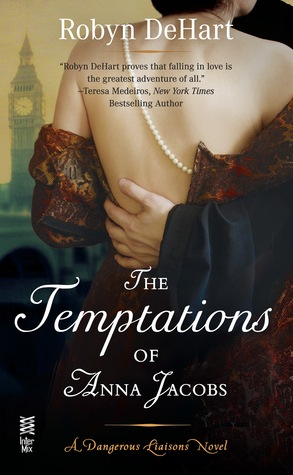 Not so.
Not so.
I liked it enough for a while, though I began to roll my eyes and declare things like, "Oh, geez, not again!" somewhere at the 60% mark. The problem with this story is it's way too repetitive. We are constantly being told or reminded of the following things over and over and over:
-Her very prim and proper and irritating as heck mother disapproves of the heroine being a doctor and would rather she marry. This had to be mentioned ten times.-The hero wants a drink; was once a raving alcoholic. This had to be 50 times.-Oh, he's a bastard. I'm going to guess 15 times.
On top of that, the irritating mother has an irritating and unnecessary-to-the story romance that did not make any sense considering her status and the time period. And I used repeated words there on purpose. The story does that as well at times. I don't think it will bother most people. It's just the old editor in me.
And when did the irritating mother decide it was acceptable to date a man who'd been in prison? Such an unexplained turnaround. Another disappointment for me was that the author glossed over what could have been extremely interesting parts and aspects such as the letters between Jack and his "student." What were these letters? Let us figure it out. Instead, all we're told is they refer to Dante's Inferno and the heroine figured out the riddle. What was it? Why not let us have some fun with this? We don't even see the letter itself.
Despite my above quibbles, I was going to give this story a three until I came to the ending. It is about a lady doctor and it does have some good scenes (involving a pig) in which she's doing relevant-to-the-case experiments. I also like the fact the hero is not an insecure alpha male.
But then it ended in such a way that I wanted to throw it against the wall. I mean, seriously, you've just witnessed a gruesome crime against humanity in which you were close enough to be covered in blood and all you can think about is love and marriage? And I'm not spoiling anything there because these stories all end the same.
I'm disappointed. I'm sorry to say that as this digital ARC was kindly provided via Netgalley.
Favorite quote: "Men--they're such confounding creatures, wouldn't you agree?"

Having recently read and enjoyed The Shadow Princess by Mary Hart Perry, also a historical romance involving an investigation for Jack the Ripper, I was eager to read this one. MHP's story was a wild and fun ride and I thought the experience would be somewhat repeated.
 Not so.
Not so.I liked it enough for a while, though I began to roll my eyes and declare things like, "Oh, geez, not again!" somewhere at the 60% mark. The problem with this story is it's way too repetitive. We are constantly being told or reminded of the following things over and over and over:
-Her very prim and proper and irritating as heck mother disapproves of the heroine being a doctor and would rather she marry. This had to be mentioned ten times.-The hero wants a drink; was once a raving alcoholic. This had to be 50 times.-Oh, he's a bastard. I'm going to guess 15 times.
On top of that, the irritating mother has an irritating and unnecessary-to-the story romance that did not make any sense considering her status and the time period. And I used repeated words there on purpose. The story does that as well at times. I don't think it will bother most people. It's just the old editor in me.
And when did the irritating mother decide it was acceptable to date a man who'd been in prison? Such an unexplained turnaround. Another disappointment for me was that the author glossed over what could have been extremely interesting parts and aspects such as the letters between Jack and his "student." What were these letters? Let us figure it out. Instead, all we're told is they refer to Dante's Inferno and the heroine figured out the riddle. What was it? Why not let us have some fun with this? We don't even see the letter itself.
Despite my above quibbles, I was going to give this story a three until I came to the ending. It is about a lady doctor and it does have some good scenes (involving a pig) in which she's doing relevant-to-the-case experiments. I also like the fact the hero is not an insecure alpha male.
But then it ended in such a way that I wanted to throw it against the wall. I mean, seriously, you've just witnessed a gruesome crime against humanity in which you were close enough to be covered in blood and all you can think about is love and marriage? And I'm not spoiling anything there because these stories all end the same.
I'm disappointed. I'm sorry to say that as this digital ARC was kindly provided via Netgalley.
Favorite quote: "Men--they're such confounding creatures, wouldn't you agree?"

Published on June 05, 2014 00:00
June 4, 2014
City of Darkness and Light: A Tale of Two Dangerous Cities
Molly Murphy is the kind of heroine known as "spunky". She is the protagonist of a mystery series written by Rhys Bowen. I decided I liked Molly when I read the first book in the series, Murphy's Law which deals with her immigration to the U.S. from Ireland. Molly is a private investigator in turn of the 20th century New York. Her first case, which precipitated her career, dealt with murder on Ellis Island. In her most recent adventure, Molly is in Paris wondering whether it's a more dangerous city than New York. She had come to stay with friends and found them missing when she arrived in Paris, and an American painter had been murdered. Paris is known as the City of Light, but Rhys Bowen has re-named it City of Darkness and Light in the title of this novel.
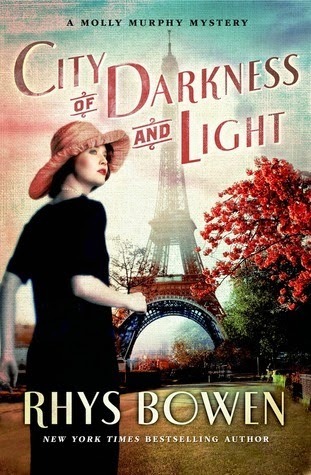
At this point in the series, Molly has married. Her husband, NYPD police captain Daniel Sullivan is no supporter of women having careers, and has decided that Molly must give up hers. So far he has had no success in stopping Molly from investigating murders. Why would Molly marry a man with such an attitude in the first place? Well, they bonded over co-investigations before their marriage, and he does care about her. He actually shipped her off to Paris because he feared for her safety in New York. The situation in New York had become quite alarming. I can only imagine his dismay if he'd learned at the time that Molly had landed in trouble in the place where he believed she'd be out of harm's way.
While she's in Paris, Molly does get to enjoy the art world. She meets Picasso, Gertrude Stein and Mary Cassatt. Mary Cassatt is actually a pivotal character in the plot. Rhys Bowen portrays this American artist, who is often considered a sentimental painter of mothers and babies, as an outspoken feminist. When I researched her for this review, I found a number of articles re-evaluating her work and the Mary Cassatt Article on Wikipedia calls her a "feminist from an early age". I was delighted to learn more about her as a result of reading and reviewing this book.
Another aspect of this book is an upsurge of anti-semitism that surfaced as a result of the Dreyfus Affair. A Jewish military officer named Alfred Dreyfus had been falsely accused of treason. A review on Goodreads said that Rhys Bowen gave the false impression that the controversy over Dreyfus had only just begun in 1905 when the book was taking place. I don't feel that Bowen did mislead readers. France was deeply divided throughout that period. I have read another mystery that took place at that time which focuses more centrally on the ongoing impact of the Dreyfus Affair called The Blood of Lorraine by Barbara Pope.
My feeling is that this is a colorful and exciting novel that provides Molly Murphy with a new milieu and new challenges. She rises to the occasion, and it becomes increasingly evident that Molly is never going to be a stay at home wife.


At this point in the series, Molly has married. Her husband, NYPD police captain Daniel Sullivan is no supporter of women having careers, and has decided that Molly must give up hers. So far he has had no success in stopping Molly from investigating murders. Why would Molly marry a man with such an attitude in the first place? Well, they bonded over co-investigations before their marriage, and he does care about her. He actually shipped her off to Paris because he feared for her safety in New York. The situation in New York had become quite alarming. I can only imagine his dismay if he'd learned at the time that Molly had landed in trouble in the place where he believed she'd be out of harm's way.
While she's in Paris, Molly does get to enjoy the art world. She meets Picasso, Gertrude Stein and Mary Cassatt. Mary Cassatt is actually a pivotal character in the plot. Rhys Bowen portrays this American artist, who is often considered a sentimental painter of mothers and babies, as an outspoken feminist. When I researched her for this review, I found a number of articles re-evaluating her work and the Mary Cassatt Article on Wikipedia calls her a "feminist from an early age". I was delighted to learn more about her as a result of reading and reviewing this book.
Another aspect of this book is an upsurge of anti-semitism that surfaced as a result of the Dreyfus Affair. A Jewish military officer named Alfred Dreyfus had been falsely accused of treason. A review on Goodreads said that Rhys Bowen gave the false impression that the controversy over Dreyfus had only just begun in 1905 when the book was taking place. I don't feel that Bowen did mislead readers. France was deeply divided throughout that period. I have read another mystery that took place at that time which focuses more centrally on the ongoing impact of the Dreyfus Affair called The Blood of Lorraine by Barbara Pope.
My feeling is that this is a colorful and exciting novel that provides Molly Murphy with a new milieu and new challenges. She rises to the occasion, and it becomes increasingly evident that Molly is never going to be a stay at home wife.

Published on June 04, 2014 00:00
June 3, 2014
It Had to Be You by Delynn Royer
 I loved this story. It's like Nancy Drew in the twenties. Only instead of depending on her daddy's money, this girl fends for herself as a fledgling reporter. I say fledgling not because she's not a good reporter, but because editors were hard pressed to give women chances back in those days.
I loved this story. It's like Nancy Drew in the twenties. Only instead of depending on her daddy's money, this girl fends for herself as a fledgling reporter. I say fledgling not because she's not a good reporter, but because editors were hard pressed to give women chances back in those days.But Trixie gets her chance when a story sorta falls in her lap via a little boy and a business card. A well-known local gangster called Johnny Blue Eyes is dead; the only witness comes to her; and it seems half the police force may be dirty. Who can she trust?
Sean Costigan, of course.
And so the unlikely duo team up, getting on each other's nerves and setting each other's pulses racing at the same time.
I love that the build up between these two is not insta-love, that they form a partnership. The story is not about sex either--there is none. I didn't find this romance predictable in the least. It being the first of a series, we got plenty of time and I like it this way.
I love the heroine. From the moment she sat on her cameraman's shoulders to get a good shot in a roomful of male reporters, I was enamored with the spunky Trixie. She even called the local police force incompetent, wild good-chasing boobs. LOL. And when she's wrong, she admits it. And she doesn't let Sean push her around.
And most of all I enjoyed the humor in this story. I laughed or chuckled more times than I can count and the humor wasn't only Trixie and Sean's parts, but sprinkled throughout the tale in what folks said to each other, under their breath, phone convos, bath-time fiascos...
Lou didn't bother to respond. It was what Carter would have called "rhetorical," and what Lou would have called "Who gives a crap?"
And of course there's a mystery. Who killed Johnny Blue Eyes? Was it his soon to be ex-wife? His lackey? His two-timing girlfriend? A rival gangster? The "key" is in the hands of a little boy named Danny---if Sean and Trixie can keep him safe.
I'll be eagerly watching for the rest of this series. LOVED this book.

Published on June 03, 2014 00:00
June 2, 2014
Joint Review: Towers of Tuscany
Our June joint review deals with Towers of Tuscany by Carol M. Cram. This is mostly a historical novel that takes place in medeival Italy. It deals with a woman who struggles to be a painter in a society where the odds are against her. There is also a contemporary story line about an art collector who rediscovers a painting by this fictional woman painter.
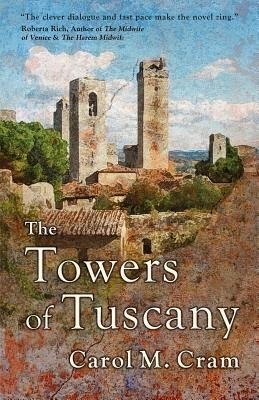
Shomeret has read a number of books like this, but has a tremendous affection for this sort of book. She read it in April and posted her impressions first. Tara joins the conversation with her impressions.
Shomeret: The central character, Sofia, learned painting from her father and assumes that her husband will support her career as a painter. I found this assumption rather naive, but Sofia is young when she decides to marry. Yet I think that she continues to have poor judgment throughout the novel. Tara, what do you think of Sofia? I finished the novel thinking that I wasn't sure whether I liked her or not. Her best choices were ones that allowed her art to flourish, but she often didn't make the right ones. I found myself asking what she was thinking a number of times.
Tara: I hated her. Loathed her. Wanted to murder her. LOL. You know I like a strong woman...and at times I felt Sofia was brave, namely when she leaves a life of comfort to dress as a boy and pursue her passion: painting. I admired that about her...but she has an arrogance and the way she treats others...as though she's granting them a huge favor by permitting them to be in presence, really rubbed me wrong.
Sofia scowled as she thought of how she would scold him when she found him. He should have known better. She would allow him to stay with her...
And I realize a painter, an artist of any type, must have confidence, but from her, it was too much. She also has HORRID taste in men. Just as I was beginning to earn respect for her, when she left Giorgio, she falls for a total--pardon me--douche bag of a man. And that is when she gets incredibly stupid and throws everything away and I wanted to murder her. WHY does man must always be a woman's downfall? Aren't we stronger than that?
Shomeret: I agree with you about Sofia's choices of men, but not all women do make the wrong choices. A woman in the medieval period who wants to paint and has disguised herself as a man in order to do so, should realize that falling in love is counterproductive. I have read other novels about medieval and renaissance female painters who disguised themselves as boys and successfully maintained their male identities and their painting careers. There is also an apocryphal story about a painter named Onorata Rodiani. The link accesses a Wikipedia article about her. She was sexually molested while painting a mural. She killed the rapist. After her rape, she disguised herself as a man and became a mercenary. I read a version of her story that said that she continued to paint as a soldier and that she eventually commanded an army of mercenaries. Unfortunately, there is no evidence that Onorata Rodiani ever existed, but I consider her story an inspiring survivor tale. Sofia, unfortunately, is no Onorata Rodiani.
The discussion guide at the back of the book says that its' theme is that "the creative impulse survives". It seems to me that the creative impulse belongs to individual artists who don't survive. I've tended to believe that the art survives, but this book shows me that whether it survives can depend on the vagaries of collectors' taste and the art market. What do you think about this book's message?
Tara: I didn't get the impression that was this story's message, though I agree with you regarding art. The creative impulse of that particular person dies with them, but their art lives forever, and if they played their cards right, their reputation. I look at art and I wonder at the person who created it, how they felt when they did, what their story is. But as for the book's message, I strongly believe it was about men being women's downfall. KEEP YOUR LEGS CLOSED. *smh* I think the message you saw could have been stronger if there had been more of the contemporary storyline. Instead, that bit didn't appear until the last 5% and at that point, I'd had enough of it, of Sofia, of the story in general.
And holy crap. Some talented author needs to write a historical novel about that Onorata Rodiani you mentioned above. I'd be all over that. Excellent find, Shomeret.
Shomeret: I discovered Onorata Rodiani many years ago. She's one of my obsessions. Perhaps one day I'll write that novel, if no one else does.
In response to your comments about the theme of Towers of Tuscany, I'm not sure that "keep your legs closed" is the message. Sofia ends up having an artistic legacy despite her foolishness. I think that's what is meant by the creative impulse surviving. It survives in other people who are inspired by the work of dead artists.
This book also asks whether it's right for a woman to prioritize art over marriage and family. Today, we think that a woman can have both, but that wasn't the case in earlier eras. Most women had to choose between having children and having a career. I know that my own mother who married in the 1950's didn't think she could be an artist and a mother, and neither did my father. So my mother faced the same dilemma as Sofia centuries later. She felt she had to choose marriage and family over art. I wish that my mother had felt stronger, but historically it was very hard for a woman to go against her family and society in general in order to pursue a vocation. Do you feel that women like Sofia should have been stronger and not cared about what other people thought about them?
Tara: That's a good question. I think...in Sofia's time, it would have been hard. I mean, upon discovery, these women dressed as boys, were whipped through the streets. That's a pretty harsh punishment. I'm not sure even I would risk that. But I feel that Sofia very nearly had it all...and threw it away. So yes, she could have been stronger, at least where it came to weakness of the flesh and her vanity. In a way, I suppose women in general are still battling that. So many women are so quick to throw everything away for a man. I'd rather be with someone than nobody at all....UGH. As you can see, that's what I really took from this book. I know I sound like a broken record...but...
As for the writing itself, Shomeret, what did you think of the flashbacks? I felt at times they provided great insight into Sofia's personality and especially her relationship with her father. At other times they felt unnecessary. But I did get a laugh from some of the things her father said. I guess what I'm saying is, I'm on the fence with the flashbacks. Perhaps they could have been cut back.
Shomeret: I also think that the flashbacks could have been cut back. I got very little from some of them.
Tara: My favorite funny line from her dad: "A healthy sow gives birth to dozens of piglets. That doesn't make the sow any less of a pig herself."
And the painting details...I found the poisonous aspect and all the grinding of things to make "paint" very interesting, but there got to be too much of it after a while. I mean, I'm not going to remember all that, you know?
Shomeret: I liked the painting details. I am a fan of novels about painters and I'm fascinated by the different techniques that painters use. I never formally studied art history, but I feel that I'm educating myself in art history through reading historical fiction about artists. This particular novel did teach me a few things about art and artists during this period, so it did have some value for me.
Tara: In conclusion, I hated this heroine and her personality and her choices so much, I didn't enjoy the book. Though I must give the author credit for not going with the traditional cheesy HEA ending. It was realistic.
Shomeret: Well, I don't think that this book was ever intended to be a romance which is demonstrated by the lack of HEA. The events in Sophia's life are intended to give us insight into the period. Although I did like some things about this book, I have to admit that I have read better books that take place in medieval Italy, and better books dealing with women who were artists.
Tara's rating:
Shomeret's rating:


Shomeret has read a number of books like this, but has a tremendous affection for this sort of book. She read it in April and posted her impressions first. Tara joins the conversation with her impressions.
Shomeret: The central character, Sofia, learned painting from her father and assumes that her husband will support her career as a painter. I found this assumption rather naive, but Sofia is young when she decides to marry. Yet I think that she continues to have poor judgment throughout the novel. Tara, what do you think of Sofia? I finished the novel thinking that I wasn't sure whether I liked her or not. Her best choices were ones that allowed her art to flourish, but she often didn't make the right ones. I found myself asking what she was thinking a number of times.
Tara: I hated her. Loathed her. Wanted to murder her. LOL. You know I like a strong woman...and at times I felt Sofia was brave, namely when she leaves a life of comfort to dress as a boy and pursue her passion: painting. I admired that about her...but she has an arrogance and the way she treats others...as though she's granting them a huge favor by permitting them to be in presence, really rubbed me wrong.
Sofia scowled as she thought of how she would scold him when she found him. He should have known better. She would allow him to stay with her...
And I realize a painter, an artist of any type, must have confidence, but from her, it was too much. She also has HORRID taste in men. Just as I was beginning to earn respect for her, when she left Giorgio, she falls for a total--pardon me--douche bag of a man. And that is when she gets incredibly stupid and throws everything away and I wanted to murder her. WHY does man must always be a woman's downfall? Aren't we stronger than that?
Shomeret: I agree with you about Sofia's choices of men, but not all women do make the wrong choices. A woman in the medieval period who wants to paint and has disguised herself as a man in order to do so, should realize that falling in love is counterproductive. I have read other novels about medieval and renaissance female painters who disguised themselves as boys and successfully maintained their male identities and their painting careers. There is also an apocryphal story about a painter named Onorata Rodiani. The link accesses a Wikipedia article about her. She was sexually molested while painting a mural. She killed the rapist. After her rape, she disguised herself as a man and became a mercenary. I read a version of her story that said that she continued to paint as a soldier and that she eventually commanded an army of mercenaries. Unfortunately, there is no evidence that Onorata Rodiani ever existed, but I consider her story an inspiring survivor tale. Sofia, unfortunately, is no Onorata Rodiani.
The discussion guide at the back of the book says that its' theme is that "the creative impulse survives". It seems to me that the creative impulse belongs to individual artists who don't survive. I've tended to believe that the art survives, but this book shows me that whether it survives can depend on the vagaries of collectors' taste and the art market. What do you think about this book's message?
Tara: I didn't get the impression that was this story's message, though I agree with you regarding art. The creative impulse of that particular person dies with them, but their art lives forever, and if they played their cards right, their reputation. I look at art and I wonder at the person who created it, how they felt when they did, what their story is. But as for the book's message, I strongly believe it was about men being women's downfall. KEEP YOUR LEGS CLOSED. *smh* I think the message you saw could have been stronger if there had been more of the contemporary storyline. Instead, that bit didn't appear until the last 5% and at that point, I'd had enough of it, of Sofia, of the story in general.
And holy crap. Some talented author needs to write a historical novel about that Onorata Rodiani you mentioned above. I'd be all over that. Excellent find, Shomeret.
Shomeret: I discovered Onorata Rodiani many years ago. She's one of my obsessions. Perhaps one day I'll write that novel, if no one else does.
In response to your comments about the theme of Towers of Tuscany, I'm not sure that "keep your legs closed" is the message. Sofia ends up having an artistic legacy despite her foolishness. I think that's what is meant by the creative impulse surviving. It survives in other people who are inspired by the work of dead artists.
This book also asks whether it's right for a woman to prioritize art over marriage and family. Today, we think that a woman can have both, but that wasn't the case in earlier eras. Most women had to choose between having children and having a career. I know that my own mother who married in the 1950's didn't think she could be an artist and a mother, and neither did my father. So my mother faced the same dilemma as Sofia centuries later. She felt she had to choose marriage and family over art. I wish that my mother had felt stronger, but historically it was very hard for a woman to go against her family and society in general in order to pursue a vocation. Do you feel that women like Sofia should have been stronger and not cared about what other people thought about them?
Tara: That's a good question. I think...in Sofia's time, it would have been hard. I mean, upon discovery, these women dressed as boys, were whipped through the streets. That's a pretty harsh punishment. I'm not sure even I would risk that. But I feel that Sofia very nearly had it all...and threw it away. So yes, she could have been stronger, at least where it came to weakness of the flesh and her vanity. In a way, I suppose women in general are still battling that. So many women are so quick to throw everything away for a man. I'd rather be with someone than nobody at all....UGH. As you can see, that's what I really took from this book. I know I sound like a broken record...but...
As for the writing itself, Shomeret, what did you think of the flashbacks? I felt at times they provided great insight into Sofia's personality and especially her relationship with her father. At other times they felt unnecessary. But I did get a laugh from some of the things her father said. I guess what I'm saying is, I'm on the fence with the flashbacks. Perhaps they could have been cut back.
Shomeret: I also think that the flashbacks could have been cut back. I got very little from some of them.
Tara: My favorite funny line from her dad: "A healthy sow gives birth to dozens of piglets. That doesn't make the sow any less of a pig herself."
And the painting details...I found the poisonous aspect and all the grinding of things to make "paint" very interesting, but there got to be too much of it after a while. I mean, I'm not going to remember all that, you know?
Shomeret: I liked the painting details. I am a fan of novels about painters and I'm fascinated by the different techniques that painters use. I never formally studied art history, but I feel that I'm educating myself in art history through reading historical fiction about artists. This particular novel did teach me a few things about art and artists during this period, so it did have some value for me.
Tara: In conclusion, I hated this heroine and her personality and her choices so much, I didn't enjoy the book. Though I must give the author credit for not going with the traditional cheesy HEA ending. It was realistic.
Shomeret: Well, I don't think that this book was ever intended to be a romance which is demonstrated by the lack of HEA. The events in Sophia's life are intended to give us insight into the period. Although I did like some things about this book, I have to admit that I have read better books that take place in medieval Italy, and better books dealing with women who were artists.
Tara's rating:

Shomeret's rating:

Published on June 02, 2014 00:00
June 1, 2014
Because I Can And You Need to See It.
Recently, there was this huge thing on Twitter called #YesAllWomen and it was various tweets from women all over the world about sexual harassment/discrimination and their outrage at misogyny.
It's getting old. We're tired of it. So very tired.
I, of course, got involved in this with retweeting and throwing my own in when something struck me. After all, I deal with it too, not sexual assault, but misogyny for certain.
And someone tweeted this video on YouTube. It's there and I can share and I feel you all need to see it. So here it is.
It's not cc'd. I have no idea the words, if any, that are being spoken, but the visual message is clear. Hear it, ladies.
It's getting old. We're tired of it. So very tired.
I, of course, got involved in this with retweeting and throwing my own in when something struck me. After all, I deal with it too, not sexual assault, but misogyny for certain.
And someone tweeted this video on YouTube. It's there and I can share and I feel you all need to see it. So here it is.
It's not cc'd. I have no idea the words, if any, that are being spoken, but the visual message is clear. Hear it, ladies.
Published on June 01, 2014 00:00
May 31, 2014
My Reading Radar 5/31/2014
Spotted this one on Netgalley and MUST HAVE. You know I love those lady soldiers stories. I am wondering though how this will compare to the recent I Shall Be Near To You. This publisher rarely disappoints me.
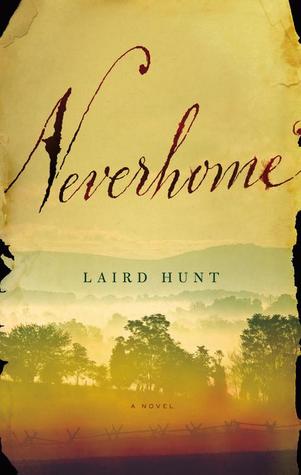 An extraordinary novel about a wife who disguises herself as a man and goes off to fight in the Civil War.
An extraordinary novel about a wife who disguises herself as a man and goes off to fight in the Civil War.
She calls herself Ash, but that's not her real name. She is a farmer's faithful wife, but she has left her husband to don the uniform of a Union soldier in the Civil War. NEVERHOME tells the harrowing story of Ash Thompson during the battle for the South. Through bloodshed and hysteria and heartbreak, she becomes a hero, a folk legend, a madwoman and a traitor to the American cause.
Laird Hunt's dazzling new novel throws a light on the adventurous women who chose to fight instead of stay behind. It is also a mystery story: why did Ash leave and her husband stay? Why can she not return? What will she have to go through to make it back home?
In gorgeous prose, Hunt's rebellious young heroine fights her way through history, and back home to her husband, and finally into our hearts.
***
 Goddess by Kelly Gardiner. Doesn't appear to be in hard copy here, but it is on Kindle. Spotted on my Goodreads feed and now on my wishlist.
Goddess by Kelly Gardiner. Doesn't appear to be in hard copy here, but it is on Kindle. Spotted on my Goodreads feed and now on my wishlist.
Versailles, 1686: Julie d'Aubigny, a striking young girl taught to fence and fight in the court of the Sun King, is taken as mistress by the King's Master of Horse. Tempestuous, swashbuckling and volatile, within two years she has run away with her fencing master, fallen in love with a nun and is hiding from the authorities, sentenced to be burnt at the stake. Within another year, she has become Mademoiselle de Maupin, a beloved star at the famed Paris Opéra. Her lovers include some of Europe's most powerful men and France's most beautiful women. Yet Julie is destined to die alone in a convent at the age of 33.
Based on an extraordinary true story, this is an original, dazzling and witty novel - a compelling portrait of an unforgettable woman.
For all those readers who love Sarah Dunant, Sarah Waters and Hilary Mantel.
***
 Spotted on NG and want very badly, but it's not available here, not even on Kindle: Luna Tango by Alli Sinclair. It first caught my interest because of the cover. The woman looks like a flamenco dancer, which interests me very much. FYI, there is actually a "tango" in flamenco. Anyway, hoping I can get my hands on this book and also hoping the author does a flamenco story.
Spotted on NG and want very badly, but it's not available here, not even on Kindle: Luna Tango by Alli Sinclair. It first caught my interest because of the cover. The woman looks like a flamenco dancer, which interests me very much. FYI, there is actually a "tango" in flamenco. Anyway, hoping I can get my hands on this book and also hoping the author does a flamenco story.
Tango, like love, is complicated
Journalist Dani McKenna delves into the world of tango to expose the decades of lies and deception that threaten three generations of her family. She’s desperate to understand the reason her mother abandoned her twenty years ago to become a world-class tango dancer, why her grandma lives in fear of all things tango, and how the brutal murder of a tango music legend in 1950s Buenos Aires now affects her family.
Dani meets the enigmatic Carlos Escudero, a revered tango dancer and man of intense passion, who helps her unravel tango’s sordid history. Despite Dani’s lack of rhythm, they create their own dance of the souls until the differences in their cultures causes a deep rift. As she seeks to reconnect with Carlos and rebuild her family, tango – the dance of passion – becomes a complicated dance of betrayal.
 An extraordinary novel about a wife who disguises herself as a man and goes off to fight in the Civil War.
An extraordinary novel about a wife who disguises herself as a man and goes off to fight in the Civil War.She calls herself Ash, but that's not her real name. She is a farmer's faithful wife, but she has left her husband to don the uniform of a Union soldier in the Civil War. NEVERHOME tells the harrowing story of Ash Thompson during the battle for the South. Through bloodshed and hysteria and heartbreak, she becomes a hero, a folk legend, a madwoman and a traitor to the American cause.
Laird Hunt's dazzling new novel throws a light on the adventurous women who chose to fight instead of stay behind. It is also a mystery story: why did Ash leave and her husband stay? Why can she not return? What will she have to go through to make it back home?
In gorgeous prose, Hunt's rebellious young heroine fights her way through history, and back home to her husband, and finally into our hearts.
***
 Goddess by Kelly Gardiner. Doesn't appear to be in hard copy here, but it is on Kindle. Spotted on my Goodreads feed and now on my wishlist.
Goddess by Kelly Gardiner. Doesn't appear to be in hard copy here, but it is on Kindle. Spotted on my Goodreads feed and now on my wishlist. Versailles, 1686: Julie d'Aubigny, a striking young girl taught to fence and fight in the court of the Sun King, is taken as mistress by the King's Master of Horse. Tempestuous, swashbuckling and volatile, within two years she has run away with her fencing master, fallen in love with a nun and is hiding from the authorities, sentenced to be burnt at the stake. Within another year, she has become Mademoiselle de Maupin, a beloved star at the famed Paris Opéra. Her lovers include some of Europe's most powerful men and France's most beautiful women. Yet Julie is destined to die alone in a convent at the age of 33.
Based on an extraordinary true story, this is an original, dazzling and witty novel - a compelling portrait of an unforgettable woman.
For all those readers who love Sarah Dunant, Sarah Waters and Hilary Mantel.
***
 Spotted on NG and want very badly, but it's not available here, not even on Kindle: Luna Tango by Alli Sinclair. It first caught my interest because of the cover. The woman looks like a flamenco dancer, which interests me very much. FYI, there is actually a "tango" in flamenco. Anyway, hoping I can get my hands on this book and also hoping the author does a flamenco story.
Spotted on NG and want very badly, but it's not available here, not even on Kindle: Luna Tango by Alli Sinclair. It first caught my interest because of the cover. The woman looks like a flamenco dancer, which interests me very much. FYI, there is actually a "tango" in flamenco. Anyway, hoping I can get my hands on this book and also hoping the author does a flamenco story. Tango, like love, is complicated
Journalist Dani McKenna delves into the world of tango to expose the decades of lies and deception that threaten three generations of her family. She’s desperate to understand the reason her mother abandoned her twenty years ago to become a world-class tango dancer, why her grandma lives in fear of all things tango, and how the brutal murder of a tango music legend in 1950s Buenos Aires now affects her family.
Dani meets the enigmatic Carlos Escudero, a revered tango dancer and man of intense passion, who helps her unravel tango’s sordid history. Despite Dani’s lack of rhythm, they create their own dance of the souls until the differences in their cultures causes a deep rift. As she seeks to reconnect with Carlos and rebuild her family, tango – the dance of passion – becomes a complicated dance of betrayal.
Published on May 31, 2014 00:00
May 30, 2014
UNSUNG HEROES: THE STORY OF AMERICA'S FEMALE PATRIOTS
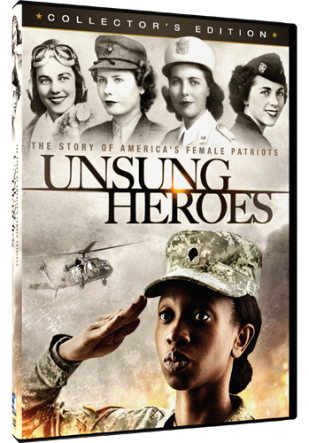 This was a documentary that aired very recently on PBS. It honors women in the American military from the Revolutionary War to present-day female veterans who served in Iraq.
This was a documentary that aired very recently on PBS. It honors women in the American military from the Revolutionary War to present-day female veterans who served in Iraq.I learned some fascinating stuff from this one...
Margaret Corbin was a woman who followed her husband to war (Revolutionary). She helped him load the cannon and when he was hurt in duty, she took over for him completely and ended up crippled with half her face blown off. She was buried outside the chapel at West Point.
Women were in the Navy as early as WWI. The Waves were created for women to take on-shore jobs, freeing men to go to sea. Meanwhile, Hello Girls were created for the Army. It's an interesting tale here...they were actually created to work the communications because the higher-ups stationed in Europe complained the operators in France were too slow. These women had to be bilingual--speak English and French.
I knew the Army had the WACS and the WASPS. I knew about the WAVES, but I did not know the Coast Guard had its own group of women: the SPARS. Someone needs to write a novel about them. A woman CG member informs us she was on a ship with a call sign that meant "no damn women aboard". Imagine working your way around that. Matter of fact, in part two, they get more into the Coast Guard thing and it wasn't until 1977, when Jimmy Carter made it an issue, that they allowed women at sea. Even in the more modern age, the men said women on ships was bad luck.
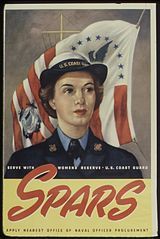 Nurses really paved the way for women in the military and combat situations. As the documentary states, whether a woman is actually in combat or not, she's in danger, so why have the anti-combat law in the first place. Countless women have been killed from just following in the medical corps, having their medical black hawks shot down, being in convoys, etc. And in the early days, this work--nursing--was VOLUNTARY.
Nurses really paved the way for women in the military and combat situations. As the documentary states, whether a woman is actually in combat or not, she's in danger, so why have the anti-combat law in the first place. Countless women have been killed from just following in the medical corps, having their medical black hawks shot down, being in convoys, etc. And in the early days, this work--nursing--was VOLUNTARY. Many woman veterans are not receiving the help they need and are homeless, especially after getting out of the military where they had equal pay. It's a shock to discover they only receive 70 cents to the man's dollar in the Civilian world. Sadly, they bring children into homelessness with them.
Until recently (actually, I imagine this is still a fear), admitting you had a mental health issue could be the end of your career.
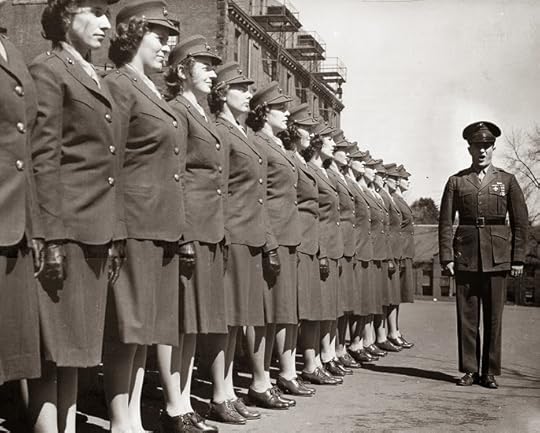 Women Marines, 1943
Women Marines, 1943It wasn't until after Vietnam that women demanded and received Veteran's services.
Linda Bray was the first woman to lead troops into battle (Panama).
Part two gets into my favorite thing: the WASP and Nicole Malachowski--the USAF's first female Thunderbird--reveals the 411 on those fine ladies. I really like her. I even have her autograph from an air show. I stood there like a little kid waiting for it. LOL So I was pleased to see her on here. She talks about how she wanted to be a fighter pilot as early as five years old (so did I!) but it was illegal for women to fly combat aircraft at the time. Those restrictions were not lifted until 1991.
 Nicole Malachowski
Nicole MalachowskiThe rest of part two talks a lot about women POWs and especially the Philippine (Bataan) situation during WWII. I've read about this before, but seeing the video footage of these men and women starved...just blew my mind. I became so riveted to the screen during these stories, I failed to take notes. You'll have to watch it for yourself, ladies.
The documentary goes back and forth between modern-day women soldiers sharing their experiences from helicopter crashes to attempted rape on Arab bases to photos and video of women in WWI, II, Vietnam, Korea...it's worth your time. I feel it also serves as a superb reminder to all...that women secured your freedom too. Honor those ladies, always.
Watch for this one on your local PBS station or buy the DVD.

Published on May 30, 2014 00:00
May 29, 2014
Empire Girls by Suzanne Hayes, Loretta Nyhan
The other girls were a candy box assortment--plump and thin, brunette and blonde, tall and short, but they all looked like they knew where the world had wanted them to go, but ran in the opposite direction as soon as they got the chance.
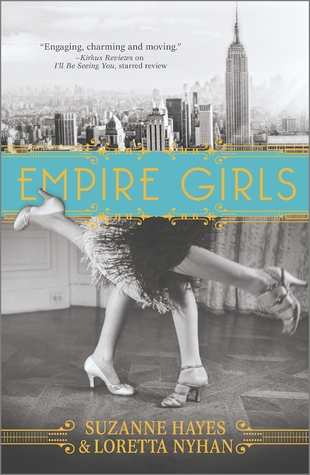 I didn't love this book, didn't hate it either. There's nothing deep here, no major revelation, but it does pass the time.
I didn't love this book, didn't hate it either. There's nothing deep here, no major revelation, but it does pass the time.
It just isn't what I was hoping for after enjoying I'll Be Seeing You so much.
It's the twenties. There's a LOT of drinking. Except for all the drinking and the speakeasy and lingo, it doesn't have a twenties feel. It doesn't scream TWENTIES, if that makes sense. I wasn't really transported to another time and place.
Two sisters who start and end with completely different and somewhat not explained personality changes are searching for a brother they never knew about until their father's passing...and this brother can determine their future. The sisters have a strange love/hate relationship, but if I had to spend 21, 22 years in another's constant presence, I can imagine that's inevitable. Frankly, both of these girls would get on my nerves. Ivy is too self-absorbed and selfish and Rose is a stick in the mud and a kiss-up at first, until she seems to become an alcoholic. LOL
"I hurried out of bed, flew down the stairs and then brought his bedtime tea back up. "Here you are, Papa. See, I will always bring your tea..."
Ugh.
Thankfully she changes, but still...
What I do like about this story is how it touches on the NYers who went to WWI and ended up trapped for a week (The Lost Battalion, Argonne) without food in France while their own fellow Americans shot at them. Sad. And these men came back and many of them were emotionally compromised and put into institutions or sleeping homeless in the park... I was so interested in this lost battalion, I did more research on my own and there was so much the authors could have done here, perhaps have the brother as a narrator, telling his story too? The soldiers even had to use pigeons to get messages out of their area. Frankly, I didn't think there was enough to this story to warrant double narratives, but if they'd added the brother's story...after all the story is supposed to be about these girls looking for their missing brother, but there is so very little really of that drama, compared to the romance and drinking and other characters in the house who don't really hold major roles.
Overall, the story felt rushed. The timeline was crazy too. At times it read as if a week had passed and a few pages later, days, and a few pages later, three weeks, and later, two weeks. I like a set timeline and this irritated me. I also thought, partly because of the cover--looks like some weird stage thing going on there--that there would be some theater life, some side story here about acting or vaudeville or something, and there wasn't. Even the ladies' jobs...not much detail about that. I mean, just WHEN does Rose do any housekeeping? Yes, I'd say there was a serious lack of details in this story. I think that's what was missing for me. And where were the other ladies of the house? Why didn't the sisters ask them about their brother? There were four ladies in the attic and three downstairs? That doesn't make sense.
Funny quote from Nell:"Terrible place, the country. Full of misfits and heathens pretending to be Christians. Humans forget to be human when they aren't surrounded by comparisons."
I received this via Netgalley. Quotes may be different in the final book.

 I didn't love this book, didn't hate it either. There's nothing deep here, no major revelation, but it does pass the time.
I didn't love this book, didn't hate it either. There's nothing deep here, no major revelation, but it does pass the time.It just isn't what I was hoping for after enjoying I'll Be Seeing You so much.
It's the twenties. There's a LOT of drinking. Except for all the drinking and the speakeasy and lingo, it doesn't have a twenties feel. It doesn't scream TWENTIES, if that makes sense. I wasn't really transported to another time and place.
Two sisters who start and end with completely different and somewhat not explained personality changes are searching for a brother they never knew about until their father's passing...and this brother can determine their future. The sisters have a strange love/hate relationship, but if I had to spend 21, 22 years in another's constant presence, I can imagine that's inevitable. Frankly, both of these girls would get on my nerves. Ivy is too self-absorbed and selfish and Rose is a stick in the mud and a kiss-up at first, until she seems to become an alcoholic. LOL
"I hurried out of bed, flew down the stairs and then brought his bedtime tea back up. "Here you are, Papa. See, I will always bring your tea..."
Ugh.
Thankfully she changes, but still...
What I do like about this story is how it touches on the NYers who went to WWI and ended up trapped for a week (The Lost Battalion, Argonne) without food in France while their own fellow Americans shot at them. Sad. And these men came back and many of them were emotionally compromised and put into institutions or sleeping homeless in the park... I was so interested in this lost battalion, I did more research on my own and there was so much the authors could have done here, perhaps have the brother as a narrator, telling his story too? The soldiers even had to use pigeons to get messages out of their area. Frankly, I didn't think there was enough to this story to warrant double narratives, but if they'd added the brother's story...after all the story is supposed to be about these girls looking for their missing brother, but there is so very little really of that drama, compared to the romance and drinking and other characters in the house who don't really hold major roles.
Overall, the story felt rushed. The timeline was crazy too. At times it read as if a week had passed and a few pages later, days, and a few pages later, three weeks, and later, two weeks. I like a set timeline and this irritated me. I also thought, partly because of the cover--looks like some weird stage thing going on there--that there would be some theater life, some side story here about acting or vaudeville or something, and there wasn't. Even the ladies' jobs...not much detail about that. I mean, just WHEN does Rose do any housekeeping? Yes, I'd say there was a serious lack of details in this story. I think that's what was missing for me. And where were the other ladies of the house? Why didn't the sisters ask them about their brother? There were four ladies in the attic and three downstairs? That doesn't make sense.
Funny quote from Nell:"Terrible place, the country. Full of misfits and heathens pretending to be Christians. Humans forget to be human when they aren't surrounded by comparisons."
I received this via Netgalley. Quotes may be different in the final book.

Published on May 29, 2014 00:00
May 28, 2014
Rebel: Loreta Velazquez, Secret Soldier of the American Civil War
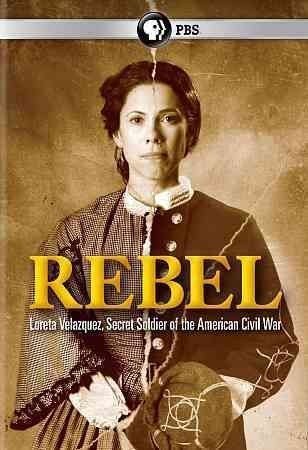 "I was bent upon showing I was as good as any man."
"I was bent upon showing I was as good as any man."I love the way this documentary was done/filmed. It's not just historians nattering away about what they read/know, with a few old photos shown here and there. It's a mixture of a woman's narrative, narrating parts from Loretta's autobiography, The Woman in Battle, and reenactments of Loretta's life from childhood to marriage to motherhood to war.
With, of course, the occasional historian and photo appropriate to the time period. There's only one known photograph of Loretta herself and even that is in doubt.
Don't know who I'm talking about? I'll tell ya the gist of it. Loretta Janeta Velazquez was born into a wealthy Cuban family and sent to the States to become a proper lady. Instead of becoming a proper lady, Loretta married a man her family didn't approve of (her best friend's boyfriend), and upon being widowed and losing her two daughters (a third stillborn), she cut off all her hair, donned her dead husband's uniform, and fought for the Confederacy, as a man.
What's strange to me, however, and sadly not explained in this documentary--it's said the reasons for her actions were not made clear--is why was a Cuban woman who wasn't even really accepted as a Southern lady, fighting to enslave others?
Though the well-to-do white Cubans did their share of slave owning, not unlike Puerto Rico. And much ado was made about how "white" or how "colored" a person of Latin descent was. Ladies in society even went so far as to pay a lot of money to prove their ancestry was "untouched" by those of darker complexions.
And the documentary does state that the city of New Orleans, where she spent her growing-up years sided with the South even though they weren't slave owners.
Even crazier, in order to be accepted by the white slave owners she was fighting alongside, Loretta bought a slave of her own--Bob. She had to enslave another, in order to explore her own freedom.
There are a lot of things about Loretta that seem contradictory. She's a hard one to figure out. But one thing is for certain: she's a fascinating woman in history who did some brave things, from fighting in the battle of Bull Run to publishing her memoirs at the risk of being publicly declared a fraud to helping with the Cuban Revolution. Did I mention she defected to the North? That put her back in my good graces. LOL
She was even wounded four times, hiding the wounds and averting treatment, in order to hide her sex. She did this until caught in 1863, when she was forced to go from soldier to spy and then became a double agent, having had her eyes open to war and what was really going on behind the battle lines.
A great documentary about an interesting woman. I do wish it had been longer. It's a mere hour, though an intriguing one.
I bought this DVD on PBS.

Published on May 28, 2014 00:00
May 27, 2014
The Scent of Murder (Dr. Dody McCleland #3) by Felicity Young
 Yet another awesome installment in this series. I liked this one even more than the last. In this story, my favorite historical medical examiner is on a vacation that goes terribly awry…in the form of a set of bones, a lord up to no good with the ladies, and a workhouse where bad things are happening to poor children. It’s Dr. Dody to the rescue.
Yet another awesome installment in this series. I liked this one even more than the last. In this story, my favorite historical medical examiner is on a vacation that goes terribly awry…in the form of a set of bones, a lord up to no good with the ladies, and a workhouse where bad things are happening to poor children. It’s Dr. Dody to the rescue.And we mustn’t forget about Pike. Her love interest, the inspector, is back, and with him he brings the early days of gun forensics/ballistics. It’s obvious to me that the author did a massive amount of research for this story and I appreciate it. I love to learn new things while being entertained and this book did not disappoint. I not only learned the early method of ballistics, but also got an eye-opening look at life in the workhouse for unprotected children.
Ms. Young doesn’t stop there though. In this installment she also tackles sexual assault and its aftereffects on the victims.
It’s history, mystery, a pinch of romance, and a dash of education in one exciting novel. And at the heart of it is an incredibly strong and admirable heroine. Please, publisher, keep this series coming, and do continue to make it available to us in the U.S., even if only on Kindle. I enjoyed this immensely. I probably don’t have to add that it is extremely well written, but there you go.
I bought this on Amazon Kindle

Published on May 27, 2014 00:00



